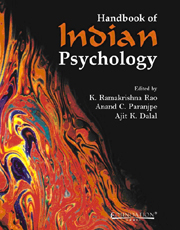Book contents
- Frontmatter
- Contents
- Contributing Authors
- Preface
- 01 Prologue: Introducing Indian Psychology
- 02 Indian Thought and Tradition: A Psychohistorical Perspective
- PART I SYSTEMS AND SCHOOLS
- 03 Jaina Psychology
- 04 The Foundations of Early Buddhist Psychology
- 05 Varieties of Cognition in Early Buddhism
- 06 A Buddhist Theory of Unconscious Mind (Ālaya-Vijñāna)
- 07 Indian Buddhist Theories of Persons
- 08 Buddhist Psychology: A Western Interpretation
- 09 Transpersonal Psychology in the Bhagavad-Gītā: Reflections on Consciousness, Meditation, Work and Love
- 10 Yoga Psychology: Theory and Application
- 11 Patañjali Yoga and Siddhis: Their Relevance to Parapsychological Theory and Research
- 12 Yoga Psychology and the, Sāṃkhyā Metaphysic
- 13 Psychology in the Advaita Vedānta
- 14 The Nyāya-Vaiśeṣika Theory of Perceiving the World of our Experience
- 15 Psychological Theories and Practices in Āyurveda
- PART II TOPICS AND THEMES
- PART III APPLICATIONS AND IMPLICATIONS
- Pronunciation and Transliteration of Sanskrit Alphabet
- Glossary
- Index
15 - Psychological Theories and Practices in Āyurveda
from PART I - SYSTEMS AND SCHOOLS
Published online by Cambridge University Press: 26 October 2011
- Frontmatter
- Contents
- Contributing Authors
- Preface
- 01 Prologue: Introducing Indian Psychology
- 02 Indian Thought and Tradition: A Psychohistorical Perspective
- PART I SYSTEMS AND SCHOOLS
- 03 Jaina Psychology
- 04 The Foundations of Early Buddhist Psychology
- 05 Varieties of Cognition in Early Buddhism
- 06 A Buddhist Theory of Unconscious Mind (Ālaya-Vijñāna)
- 07 Indian Buddhist Theories of Persons
- 08 Buddhist Psychology: A Western Interpretation
- 09 Transpersonal Psychology in the Bhagavad-Gītā: Reflections on Consciousness, Meditation, Work and Love
- 10 Yoga Psychology: Theory and Application
- 11 Patañjali Yoga and Siddhis: Their Relevance to Parapsychological Theory and Research
- 12 Yoga Psychology and the, Sāṃkhyā Metaphysic
- 13 Psychology in the Advaita Vedānta
- 14 The Nyāya-Vaiśeṣika Theory of Perceiving the World of our Experience
- 15 Psychological Theories and Practices in Āyurveda
- PART II TOPICS AND THEMES
- PART III APPLICATIONS AND IMPLICATIONS
- Pronunciation and Transliteration of Sanskrit Alphabet
- Glossary
- Index
Summary
Āyurveda, the “science of life” has emerged out of the philosophies of ancient India. Western philosophy and contemporary psychology have promoted Cartesian dualism of the mind and body, and scientific parsimony and specialization as hallmarks of scientific advancement. Āyurveda is anchored in Sāṃkhyā philosophy, which has anticipated the most advanced concepts of contemporary science. As there is no compartmentalization of the various disciplines, the medical system of Āyurveda follows the Sāṃkhyā tradition in its scientific approach. The major āyurvedic treatises are the compilations of works of Caraka, Suśruta, Vāgbhaṭas, the younger and the elder, and Kaśyapa, especially for children's diseases. Āyurvedic practises incorporate bio-psycho-social domains of human existence. Exemplifying the holistic approach, it has the following components:
Scientific methodology (Sāṃkhyā system)
Sociological observations (gṛahaśāstras)
Cultural practices (gṛahaśāstras, vedic rites and folk practices)
Āyurveda has eight branches:
Internal medicine (kāyāchikitsā)
Surgery, general and special (salya tantra)
Otto-rhino-laryngeology and ophthalmology (salakya tantra)
Women's diseases and pediatrics (stṛīroga and kaumāra bhratya)
Geriatrics and immunology (jarachikitsā/rasāyāna)
Eugenics and aphrodisiacs (vajikaraṇa)
Toxicology (damśachikitsā)
Psychological medicine (bhūta vidyā)
It is only in the recent times that foray into general systems and chaos theories, gene research and nano-technology has led to the broadening of scientific perspectives to accommodate the complex nature of man and his universe. In the field of psychology, health psychology has moved beyond the strict boundaries that had been laid down. The strength of health psychology lies in its holistic approach and its emphasis on empirical validation.
- Type
- Chapter
- Information
- Handbook of Indian Psychology , pp. 299 - 310Publisher: Foundation BooksPrint publication year: 2008
- 2
- Cited by

